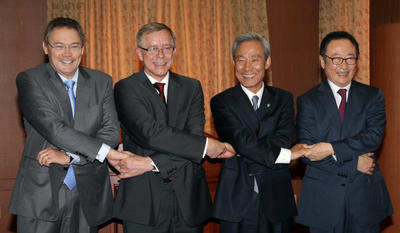Specifically, the EU cannot assist Korea with its acute security dilemma, and ‘sovereigntist’ Korea does not share EU preferences for soft power, regionalisation and multilateral collective security. Still, Korea is likely to maintain the relationship for the cost-free prestige it offers, and the EU will consider this ‘Asian bridge’ as justification for promoting liberal-democratic values in a non-European context. Europhile, pro-regionalist elites may also pursue inter-regional rather than state-level ties to bolster the European Commission’s legitimacy within Europe, but deep Korean attachment to the Westphalian state model will ultimately stymie this project.
Neither the EU nor South Korea can meaningfully contribute to the other’s primary security challenges — often a basic necessity for deeper bilateral relations among states. The EU, for example, lacks the ability to seriously project its power far from the continent, it cannot meaningfully deter North Korea or China, and EU land forces do not bolster US forces in South Korea. And although a participant in the Proliferation Security Initiative and the (now defunct) Agreed Framework, the EU plays no role in the Six-Party Talks. Similarly, Korea is irrelevant to big EU security issues, such as Russia’s future development, terrorism and the Middle East, or Eastern Europe’s stabilisation. Their shared liberal-democratic values place them broadly in the liberal security community of the democratic peace, but a more positive military contribution to either’s security is unlikely.
Despite this apparent lack of depth in security ties, both sides still derive prestige from the relationship. South Korea, small and peripheral to the global economy until recently, captures most of these benefits — a bilateral relationship with Europe flatters the Korean imagination. For the EU, an already well-known and highly recognised global player, there is little direct prestige to be gained from the relationship. But the Korean partnership does benefit pro-European elites within the EU, most notably in the European Commission/EU bureaucracy. The ‘eurocracy’, trapped in a decades-long turf battle with the national bureaucracies, is likely to seize on the prestige of a direct EU-level relationship with a G20 economy. This is ammunition against criticism that the EU is simply a trade deal or that other states do not take it seriously. If South Korea, as the host of the 2010 G20 Summit, takes the EU seriously enough to label it a ‘strategic partner’, then the eurocracy benefits in the intra-European conflict to establish the EU more soundly. This in turn may eventually permit a real Common Foreign and Security Policy to be established.
Finally, the EU also reaps psychological gains from having its domestic values validated. South Korea is a great success in the transplantation of liberal, democratic, Enlightenment values outside of the West, and is routinely touted as evidence that these values are not ‘Western’, but universal. This excises the cultural–racial bite of the ‘Asian values’ and ‘human-rights imperialism’ arguments of Asian actors such as the Chinese Communist Party and Mahathir Mohamad.
But in the end, the EU and South Korea have a largely unremarkable relationship. Given the mutual irrelevance of one’s security to the other, it is easy to predict that no stronger alliance is likely. The FTA is a step forward, but ultimately one based solely on material utility. The EU also trades with Singapore, and Korea has a ‘strategic partnership’ with Kazakhstan, providing a greater sense of perspective about the post-FTA rhetoric of ‘strategic partners’. A ‘friendly partner’ is a more credible assessment, but the EU-Korea relationship will even then not mature into a meaningful bond to rival the more critical relations with the US, China, Japan or Russia.
The EU’s preference for Asian regionalism — which it expresses through forums such as the Asia-Europe Meeting (ASEM) — will generate friction, although South Korea will tolerate this in order to retain the prestige boost associated with an EU relationship. Hence the greatest frustration will fall on the European side. The gains to Korea’s prestige have already been achieved through the completion of the FTA and the ‘strategic partnership’, while the EU cannot leverage a security contribution to the peninsula to push Korea further into the East Asian Community (EAC) or ASEM. So long as Korea, and East Asia generally, remains committed to the ‘ASEAN Way’ of talk-shop inter-governmentalism, Kantian-Europhilic elites — who are pro-EU, pro-EAC and pro-ASEM — are likely to find nationalist Korea, and Asia, a frustrating inter-regional partner.
Robert E. Kelly is Assistant Professor at the Department of Political Science and Diplomacy, Pusan National University, South Korea. He blogs at Duck of Minerva and his own Asian Security Blog.
A longer version of this article was first published here in International Relations of the Asia-Pacific.

